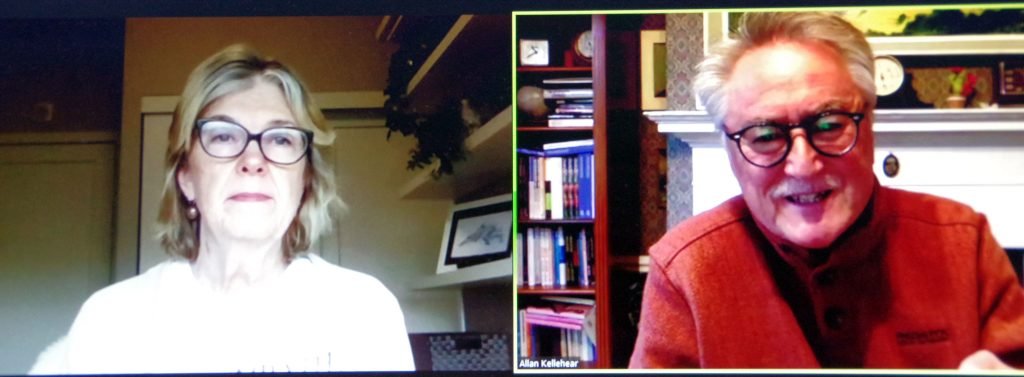Compassionate Ottawa’s online gathering drew hundreds of followers
Is end of life care everyone’s responsibility? Are some people, seniors perhaps, more uncomfortable when dealing with end of life issues? And how can the idea of end of life care be fostered with compassion in the community?
These were some of the questions that came up during an online conversation on Oct. 28 between between Dr. Allan Kellehear, a British public health sociologist specializing in end of life care, and Dr. Mary Lou Kelley, a Canadian expert in gerontology and palliative care, with practice, teaching and research experience dating back to the early 1970s.
Followed by hundreds
The live Zoom presentation, the first of a series of conversations planned by Compassionate Ottawa, was followed by several hundred people across Canada and around the globe. Compassionate Ottawa is an umbrella group in the nation’s capital for several healthcare provider organizations that promote a grassroots community-based model of care for those facing life threatening illnesses.

Dr. Kellehear founded and developed the main public health model for care of the dying, the bereaved and caregivers. This model is based on the application of health promotion, community development, and social ecology ideas and principles. He is the author of a number of books on dying, death and the compassionate community movement. He also developed the Companionate City Charter.
Everybody’s business
Dr. Kelley’s research has used participatory and community development approaches to empower and support community members and front-line workers and create changes to improve end of life for people, their families and communities. Her major research contributions have been in rural and First Nations communities and long-term care homes. She is a member of Compassionate Ottawa’s advisory council.
Bereavement is something that goes on for more than just weeks, months or years – it lasts forever
renowned end of life expert Dr. Allan Kellehear
So, why should end of life care be everybody’s business? As Dr. Kellehear pointed out, health today is increasingly everybody’s business. “Most people understand that, and that’s why they try to eat better, and why they exercise, and why there are policies in the workplace to protect workers and policies in schools to protect student,” he said.
Bereavement continues
He said these principles apply to end of life care. “When there’s a crisis, we have services. And that is exactly the same for end of life care.” He said bereavement is a phenomenon that doesn’t last for just a period of weeks or even months or years. “It lasts forever. And the response to supporting people is grief and bereavement is not service provision. If it was, every second person would be a grief counsellor.
“So, unless we understand that outside the very specific acute model of palliative care and hospice care, the people who live with lasting illnesses and long-term caregiving and grief and bereavement and advanced aging are all around us – they’re all around us.
We are all responsible
“And it’s not dying, and it’s not bereavement per se which is the problem, but the companions that follow those two journeys: the anxiety, the depression, the social isolation, the loneliness, the stigma, the social rejection, the job loss, the lost school days, the suicide, the sudden death. All of these things are amenable to prevention and harm reduction and they can be done by you and me.”
Dr. Kelley, who worked extensively with Indigenous communities in Canada, noted that they tend to support one another with issues such as caregiving as families, rather than through institutions like hospitals or retirement residences. She said there is a similar attitude in the Netherlands, where the dying are often cared for at home.
Cultural changes
Dr. Kellehear said that in Japan, care for the dying and the bereaved was at one time “a family affair,” although now “there’s stigma if you don’t send grandma to the hospital as soon as she looks pale. The idea of a good son [in Japan] is to make sure your parents get the best medical services.”
However, he added, there’s been a change in attitudes since the Second World War and the weight of responsibility has been shifted to the health care system. “And that’s not only in Japan,” he continued. “It’s been happening all over the world.”














